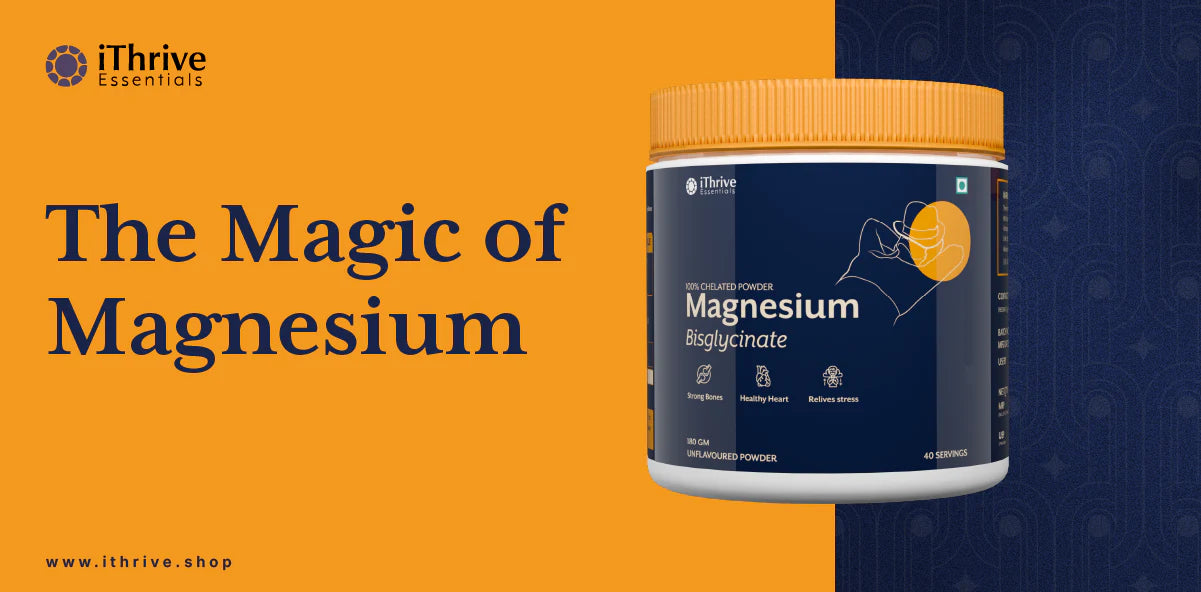
The Magic of Magnesium
Iron Man? Old news!
It’s time for Magnesium Man.
Taking supplements that contain magnesium, especially in high doses, can leave a metallic taste in your mouth. However, taking magnesium in the form of the iThrive’s supplement will most definitely not do the same.
The powdered supplement is everything - fettering between tasteless and sweet - with no metallic aftertaste unlike other magnesium supplements, making it very convenient to consume for adults and children alike.
The cleanest form of Magnesium, iThrive’s Magnesium Bisglycinate Supplement provides a bioavailable bis-glycinate chelate form of magnesium - in a flexible powder format that one can use with an everyday smoothie or juice. Magnesium’s unblended form is an unbeaten form of the supplement, rendering it incomparable to the variety of over a 1000 variants of Magnesium dietary supplements available today. The supplement’s growth and global demand has been projected to almost double by 2032, which leads to the primary question - What does Magnesium really do?
The Benefits of Magnesium
Magnesium is an abundant mineral in our body and is naturally present in many foods. Additionally added to many other food products and clinical medications as well, it is also available as a dietary supplement. Magnesium is a cofactor in more than 300 enzyme systems that regulate biochemical reactions in our body, ranging from protein synthesis, muscular nerve function, along with blood glucose and pressure regulation control.
An adult body contains approximately 25 g of magnesium, with about 50% to 60% present in our bones and the rest safely stored in our body’s soft tissues. Less than 1% of the total magnesium is in our body’s blood serum, and these levels are kept under tight surveillance. Magnesium is required for energy production, oxidative phosphorylation, and glycolysis.
It contributes to the structural development of bone and is required for the synthesis of DNA and RNA. Playing an important role in the transportation of calcium and potassium ions, this active transport along the cell membranes assists in nerve impulse conduction and normal heart rate regulation, which in turn is fueled by the powdered magnesium bisglycinate itself.
The many benefits of Magnesium include

- Boosts Metabolism: Magnesium is involved in energy production, oxygen uptake, and electrolyte balance; therefore playing a key role in metabolism. Numerous studies suggest that magnesium may also help improve exercise and athletic performance.
- Blood Sugar Control: Studies suggest that higher magnesium levels correspond to better insulin sensitivity. Magnesium supplementation can both improve insulin response and lower the levels of blood sugar.
- Maintains Cardiovascular Health: Higher recommended magnesium intake may reduce the chances of stroke and regulate blood pressure; reducing hypertension risk and occurrence.
- Improves Sleep: As we age, we experience changes in our sleep levels. Magnesium helps quieten our nervous system, leading to an increased calm and relaxed state during sleep.
- May help alleviate PMS: Premenstrual syndrome, or PMS, is a group of physical and emotional symptoms that start one to two weeks before your period. In combination with Vitamin B6, magnesium may help alleviate some of these symptoms.
- Electrolyte Transport: Magnesium is essential for regulating levels of key electrolytes, chiefly potassium and sodium. Electrolytes are involved in regulating nerve and muscle function, hydrating the body, and balancing blood pressure.
- Bone Strengthening: Population studies have reported positive associations between magnesium intake and bone mineral density levels, in both men and women. This is primarily due to magnesium being involved in bone formation, as well as its role in optimizing our use of Vitamin D.
Are all Magnesium Supplements good for you?
Magnesium supplements have many forms. These include:
- Magnesium Bisglycinate
- Magnesium Citrate
- Magnesium Bicarbonate
- Magnesium Oxide
- Magnesium Malate
- Magnesium Taurate
- Magnesium L-threonate
-
Magnesium Sulfate
Out of these, the best forms for supplementation include:
- Magnesium Glycinate or Bisglycinate
- Magnesium Bicarbonate
- Magnesium Taurate
- Magnesium L-threonate
- Magnesium Malate
- Magnesium Sulfate
However, even though it is easier to obtain all these forms from a Magnesium Chelate complex, we do not suggest taking it in such a way. iThrive recommends sampling just one form at a time in order to understand what form works best for you.
Magnesium citrate (also listed as magnesium carbonate with citric acid) is NOT a recommended form of magnesium due to the interference of citric acid on the action of ceruloplasmin. We also do not recommend Ascorbate, Glutamate, and Aspartate forms.
The meaning of Magnesium Bisglycinate
The compound magnesium bisglycinate is also known as magnesium glycinate. The term “bis” means again, meaning twice the amount of glycinate. In simpler terms, our friendly magnesium molecule is held by two glycine molecules, leading to superior absorption due to increased solubility.
Why Magnesium Bisglycinate?
Glycine takes up a lot of space within the magnesium molecule, preventing interference from phytates that would otherwise hinder absorption.
A crossover study found that serum levels of magnesium over eight hours were highest for magnesium bisglycinate, followed by dimagnesium malate, with magnesium oxide being the least absorbed.
Glycine decreases the pH of our intestines, increasing absorption. iThrive’s Magnesium Bisglycinate complex ensures that glycine takes up active sites on the molecule, reducing water retention and minimizing the laxative effect seen in other magnesium supplements.
The Benefits of Glycine

Glycine is a highly therapeutic amino acid. It is anti-inflammatory and has pro-metabolic properties.
- Increase glutathione
- Improve quality of sleep
- Increase a healthy lifespan
- Reduce tissue inflammation
- Reduce high blood pressure
What is Magnesium Deficiency?
Magnesium deficiency occurs when your body does not get enough magnesium from your diet to function properly.

Symptoms of Magnesium Deficiency
- Low appetite
- Nausea, vomiting
- Muscle spasms or tremors
- Abnormal heart rhythms
- Fatigue, weakness
- Inability to relax
Causes of Magnesium Deficiency
Magnesium deficiency is rare in healthy people, but it can be caused by:
- Poor diet lacking magnesium sources
- Type 2 diabetes
- Digestive issues (e.g., Crohn’s disease)
- Long-term vomiting or diarrhea
- Use of diuretics or reflux medications
- Alcoholism
- Heavy physical activity
Treatment and Diagnosis
Magnesium deficiency can be diagnosed through blood or urine tests. Low levels of potassium, calcium, or magnesium may prompt further testing.
Treatment typically involves magnesium supplements. In severe cases, intravenous supplementation may be required.
How to Prevent Magnesium Deficiency?
A well-balanced diet helps prevent nutrient deficiencies. However, obtaining the daily magnesium requirement solely from food can be challenging. Nuts, seeds, and seafood are rich sources, but not always consumed in sufficient quantities.
Magnesium supplements provide a safe and effective solution. One scoop of iThrive Essentials Magnesium Bisglycinate provides approximately 440 mg of elemental magnesium, fulfilling daily requirements.
Why is Magnesium Deficiency So Common?
Modern food processing removes up to 80% of magnesium from foods. Historically, humans obtained magnesium from natural water sources, but modern filtration systems have significantly reduced its presence.
Changes in dietary habits, stress, and various diseases contribute to poor magnesium absorption and increased excretion.
Magnesium deficiency is linked to conditions like cardiovascular diseases, metabolic disorders, skeletal issues, respiratory illnesses, and neurological disorders (stress, depression, and anxiety).
Stress and Magnesium: The Connection
Stress depletes magnesium levels as the body requires more energy production (Mg-ATP). Chronic stress leads to inflammation, oxidative stress, and cell damage. Magnesium deficiency can further exacerbate inflammatory responses.
Recommended Magnesium Intake
According to FSSAI 2020 guidelines, the recommended dietary allowance for magnesium is 440 mg per day. Many individuals fail to meet this requirement through diet alone.
For those experiencing high stress, magnesium intake may need to increase to 700-800 mg per day. The optimal dose is about 5 mg per pound (or 10 mg per kg) of body weight per day.
Consulting a nutritionist can help determine the ideal magnesium intake for individual needs.
Capsule vs. Powdered Magnesium

Both capsule and powder forms contain the same magnesium. Capsules use HPMC shells with preservatives, while powder has no additives.
The powder form is preferred as it can be mixed with water for easier consumption.
Why Choose iThrive Essentials Magnesium Bisglycinate?
Our supplement is clean, easy to use, and available in a powdered format. It has no metallic aftertaste and is free from artificial fillers. Suitable for both children and adults, it is third-party lab-tested for quality.
 Get your supplement here today!
Get your supplement here today!


Leave a comment
This site is protected by hCaptcha and the hCaptcha Privacy Policy and Terms of Service apply.